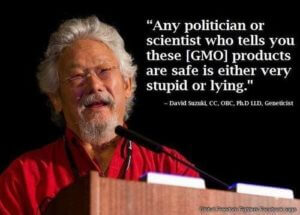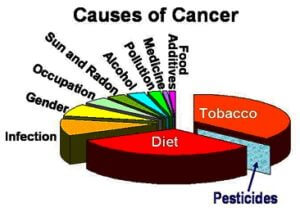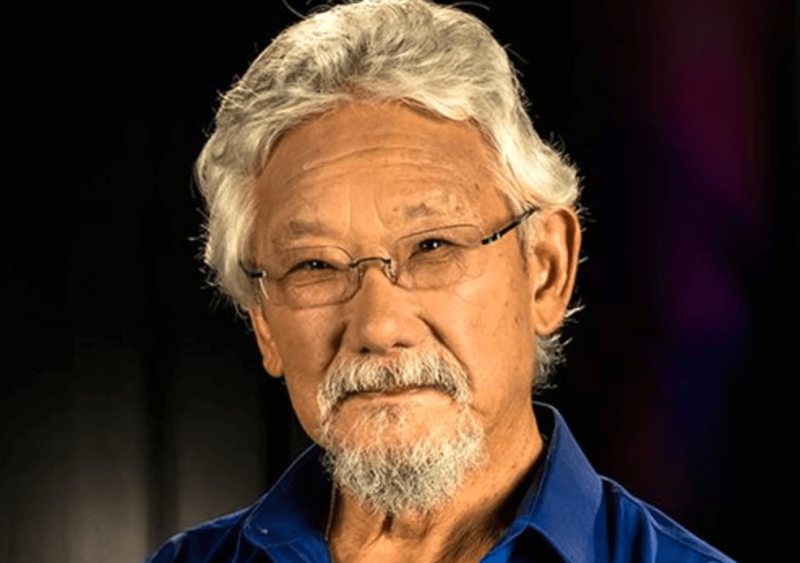David Suzuki is a zoologist turned popular host of science and environmental television and radio programs in Canada. He has made several documentaries and written over 50 books, including many children’s science books. Suzuki is an environmental activist who controversially advocates against genetically modified foods, pesticides and other products and technologies that he views as unnecessary and destructive human interventions in the natural world.
The David Suzuki Foundation, which he co-founded in 1990, is an influential environmental advocacy organization in Canada, pushing for science-based action on climate change and protecting the oceans, but also for outright bans of GMOs as well as several commonly-used safe pesticides–positions outside the science mainstream. Suzuki stepped down from his foundation’s board of directors in 2012 due to concerns that his controversial science views, which many critics believe are outside the mainstream, would jeopardize the organization’s nonprofit status in Canada.
Suzuki has a Ph.D. in zoology from the University of Chicago and was the head of one of Canada’s largest genetics labs, at the University of British Columbia. He said he made the decision to turn away from genetics research in the early 1980s because he believed the dangers of its application outweighed the benefits. “I deliberately chose to refrain from any experimentation involving recombinant DNA. I stopped applying for government grants and finally terminated my career in active research,” he wrote.
As his interest in research waned, his celebrity in Canada, and worldwide, grew. He is most well-known as the host of the popular Canadian Broadcasting Corporation television show The Nature of Things, which he took over in 1979. Suzuki has been named Canada’s “Most-Trusted Influencer” multiple times, most recently in 2015 by Reader’s Digest, which dubbed him “the éminence grise of environmentalism.”
Despite his background in genetics, Suzuki’s views on genetic engineering are not in line with the scientific consensus on their safety. Suzuki has spoken publicly about his concerns with GMOs and his foundation advocates against their use. He has written that “products of biotechnology are being rammed into our food, onto our fields and into our medicines, without any public participation in discussions and with the complicity, indeed, the active support and funding of governments. But there are profound health, ecological and economic ramifications of this activity.”
 In a 1999 CP Wire article, Suzuki is quoted as saying: “Any politician or scientist who tells you these products are safe is either very stupid or lying.” In June 2016, 110 Nobel Laureates publicly endorsed a statement affirming that GM foods are as safe or safer than non-GMO varieties. A PEW survey of American Association for the Advancement of Science in 2015 found 88% also believed GMOs were safe–a stronger consensus than the belief that global warming is human-induced.
In a 1999 CP Wire article, Suzuki is quoted as saying: “Any politician or scientist who tells you these products are safe is either very stupid or lying.” In June 2016, 110 Nobel Laureates publicly endorsed a statement affirming that GM foods are as safe or safer than non-GMO varieties. A PEW survey of American Association for the Advancement of Science in 2015 found 88% also believed GMOs were safe–a stronger consensus than the belief that global warming is human-induced.
Suzuki’s claim is often advanced as a challenge to the scientific consensus by activists, such as Jeffrey Smith in this hilarious Comedy Central satire on the bogus science behind some anti-GMO beliefs, and by anti-GMO NGOs, such as GMWatch.
In an interview featured on the American Scientist website, Suzuki argued that the science behind GMOs has not been proven and therefore GMO crops should not be hurried to farmers. “I am shocked at how little my colleagues in genetics pay attention to history. They actually forget how ignorant we are—that although we have achieved incredible manipulative powers, we know next to nothing about the real world in which those manipulations will reverberate,” he said. In an interview with CBC TV, Suzuki claimed that the science showing GMOs are safe is “very, very bad science” and that the commercialization of GMOs is “driven by money.” In 2013, Suzuki fielded live questions on an Australian television show and was asked several questions by Australian professors critical of his views on GMOs. To one question, Suzuki responded that he is “ashamed of his colleagues in genetics” for not being open-minded to the possibility of negative effects. His foundation’s website includes an “Understanding GMO” page which claims, “the safety of GMO foods is unproven and a growing body of research connects these foods with health concerns.”
In contrast to Suzuki’s views, Health Canada, the American Association for the Advancement of Science, the American Medical Association, the World Health Organization, and several other scientific and medical institutions from around the world have all concluded that genetically modified foods are safe to eat. A National Academies of Sciences report which reviewed more than 900 studies found that “no adverse health effects attributed to genetic engineering have been documented in the human population.”
Suzuki’s idiosyncratic science beliefs have been criticized by several journalists and scientists. “The reality of David Suzuki now seems completely at odds with the perception of David Suzuki. On a number of issues, he is not informing Canadians, but misinforming them. Rather than scientists getting their messages out through David Suzuki, they’re having to undo the damage his words are causing,” wrote Rob Breckenridge in the National Post in 2014.
“Many environmentalists have assured me in private—for obvious reasons, environmentalists dare not disagree with the Most Trusted Canadian in public,” wrote Stephen Gordon at Maclean’s in 2012. He has been criticized for saying that Canada should not accept more immigrants because the country is at its environmental capacity. During an open forum in 2013, Suzuki was criticized for his views on GMOs by an Australian scientist working on biofortified GMO banana research intended to improve the health of the world’s poorest citizens.
Suzuki has also made claims about other scientific issues that are at odds with consensus science. In a January 2017 article posted by the activist site EcoWatch, Suzuki wrote, “scientists suggest up to 90 percent of cancer is caused by environmental factors,” without citing a source. He places the blame on “massive use of pesticides, artificial fertilizers and literally tens of thousands of different molecules synthesized by chemists.” That grossly contradicts mainstream science. Suzuki’s 90 percent figure contrasts with the National Cancer Institute’s review of the academic literature, which estimated that 4 to 19 percent of cancers are caused by involuntary exposure to environmental exposures and only a tiny fraction of that linked to pesticides and other chemical exposure.
Education
Suzuki attended Amherst College in Massachusetts where he earned a B.A. in Biology in 1958. He earned a Ph.D. in Zoology from the University of Chicago in 1961.
Career
Academic
Suzuki worked at the Oak Ridge National Laboratory from 1961 to 1962, then as an assistant professor at the University of Alberta from 1962 to 1963. From 1963 until his retirement in 2001, he was a professor in the department of genetics at the University of British Columbia.
Broadcasting
In 1970, Suzuki began his television career with the weekly children’s show Suzuki on Science. He founded the radio program Quirks and Quarks in 1974. Suzuki is best known for hosting The Nature of Things, a Canadian Broadcasting Company television series, which began in 1979. The series has aired in nearly fifty countries worldwide. Suzuki’s 1985 series, A Planet for the Taking, averaged more than 1.8 million viewers per episode and earned him a United Nations Environment Programme Medal. In 1993, he hosted the Public Broadcasting Service series The Secret of Life. Suzuki published a book, The Sacred Balance, in 1997, which was made into a five-hour mini-series on Canadian public television in 2002. Suzuki also produced Yellowstone to Yukon: The Wildlands Project for the Discovery Channel in 1997.
Author
Suzuki is the author of 52 books, including 19 for children. Popular titles include David Suzuki: The Autobiography, Tree: A Life Story, The Sacred Balance, Genethics, Wisdom of the Elders, Inventing the Future, and the series of children’s science books, Looking At Senses. He won the Nautilus Book Award for his 2011 book The Legacy.
Activism
Suzuki has written articles, given interviews to journalists, and spoken publicly about his views on science and environmental issues. Although he is better known for his activism on climate change issues, he has also taken on the issue of genetically modified organisms. Suzuki has given interviews to reputable media outlets on the dangers that GMOs pose to human health.
He has written that “products of biotechnology are being rammed into our food, onto our fields and into our medicines, without any public participation in discussions and with the complicity, indeed, the active support and funding of governments. But there are profound health, ecological and economic ramifications of this activity.” In a 1999 CP Wire article, Suzuki is quoted as saying: “Any politician or scientist who tells you these products are safe is either very stupid or lying.” In an interview featured on the American Scientist website, Suzuki argues that the science behind GMOs has not been proven and therefore GMO crops should not be hurried to farmers. “I am shocked at how little my colleagues in genetics pay attention to history. They actually forget how ignorant we are—that although we have achieved incredible manipulative powers, we know next to nothing about the real world in which those manipulations will reverberate,” he said. In an interview with CBC TV, Suzuki argues that the science showing GMOs are safe is “very, very bad science” and that the commercialization of GMOs is “driven by money.” In 2013, Suzuki fielded live questions on an Australian television show and was asked several questions by Australian professors critical of his views on GMOs. To one question, Suzuki responded that he is “ashamed of his colleagues in genetics” for not being open-minded to the possibility of negative effects.
David Suzuki Foundation
The David Suzuki Foundation was co-founded by Suzuki and his second wife Tara Cullis in 1990 after Suzuki issued a public warning that the world was facing impending environmental catastrophe linked to climate change on his hit CBC radio program, It’s a Matter of Survival. It is a non-profit environmental organization incorporated in both Canada and the United States. It is headquartered in Vancouver, British Columbia, with offices in Montreal and Toronto. The organization’s mission is “to protect the diversity of nature and our quality of life, now and for the future.” Its vision is “that within a generation, Canadians act on the understanding that we are all interconnected and interdependent with nature.” In 2015, the organization’s revenues totaled $11,961,236. According to their website, individual donors provide 55 percent of the foundation’s budget.
The foundation’s website includes an “Understanding GMO” page which claims, “the safety of GMO foods is unproven and a growing body of research connects these foods with health concerns.”
Suzuki stepped down from the foundation’s board of directors in 2012 due to concerns that his political views would jeopardize the organization’s nonprofit status in Canada.
Criticisms
Suzuki’s activism has been criticized by several journalists and scientists. “The reality of David Suzuki now seems completely at odds with the perception of David Suzuki. On a number of issues, he is not informing Canadians, but misinforming them. Rather than scientists getting their messages out through David Suzuki, they’re having to undo the damage his words are causing,” wrote Rob Breckenridge in the National Post in 2014. “Many environmentalists have assured me in private—for obvious reasons, environmentalists dare not disagree with the Most Trusted Canadian in public,” wrote Stephen Gordon at Maclean’s in 2012.
In 2013, Suzuki fielded live questions on an Australian television show and was asked several questions by Australian professors critical of his views on GMOs. He has been criticized for saying that Canada should not accept more immigrants because the country is at its environmental capacity.
Personal Life
Suzuki was born in 1936 in Vancouver, British Columbia. During World War II, the Canadian government sold the family’s dry-cleaning business, sent Suzuki’s father to a labor camp, and placed the rest of the family, including Suzuki, in an internment camp due to their Japanese heritage. After the war, Japanese Canadian families were forced to move east of the Rocky Mountains. The Suzukis moved to London, Ontario, where David attended London Central Secondary School.
Suzuki was married to Setsuko Joane Sunahara from 1958 to 1965. The couple had three children, Tamiko, Troy, and Laura. In 1973, Suzuki married his second wife, Tara Elizabeth Cullis, 13 years his junior, with whom he had two daughters, Severn and Sarika. Following in her father’s footsteps, Severn Cullis-Suzuki is a Canadian environmental activist, speaker, television host, and author. David Suzuki has six grandchildren.
Sources
- http://davidsuzuki.org/what-you-can-do/queen-of-green/faqs/food/understanding-gmo/
- http://action2.davidsuzuki.org/monarchmanifesto
- http://action2.davidsuzuki.org/neonics
- http://www.ecowatch.com/suzuki-biocentism-2203324815.html
- https://www.cancer.gov/about-cancer/causes-prevention/risk/substances/carcinogens
- http://www.davidsuzuki.org/david/complete-book-list/
- http://www.americanscientist.org/bookshelf/pub/david-suzuki
- http://www.cbc.ca/archives/entry/david-suzuki-speaks-out-against-genetically-modified-food
- http://www.davidsuzuki.org/about/our-story/
- http://www.davidsuzuki.org/about/
- http://www.davidsuzuki.org/donate/financial-information/
- http://www.davidsuzuki.org/about/faq/#where-does-the-foundations-funding-come-from
- https://www.realagriculture.com/2013/09/david-suzuki-gets-challenged-by-actual-scientists-in-australia/
- http://www.torontosun.com/2013/09/27/down-under-blunder-david-suzuki-unmasked-as-a-know-nothing-huckster-on-australian-tv
- https://www.youtube.com/watch?v=1hKdmQMVJ70
- http://www.davidsuzuki.org/david/
- https://en.wikipedia.org/wiki/Severn_Cullis-Suzuki































